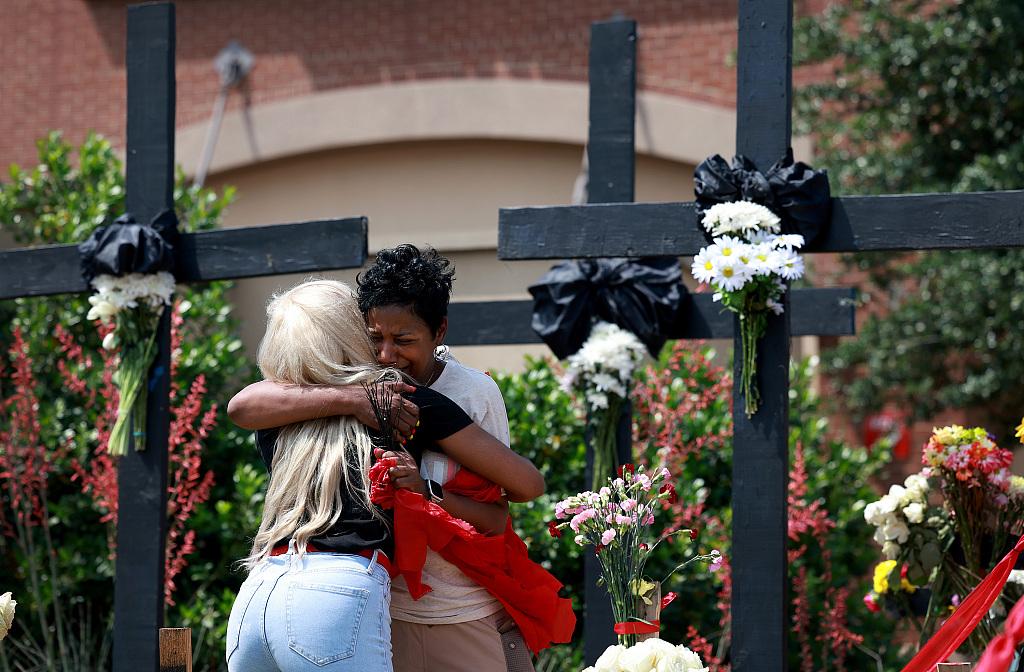The paranoia that fuels American gun violence
- By Mitchell Blatt
 0 Comment(s)
0 Comment(s) Print
Print E-mail China.org.cn, May 16, 2023
E-mail China.org.cn, May 16, 2023

People embrace as they visit a memorial near the scene of a mass shooting at the Allen Premium Outlets mall in Allen, Texas, on May 8, 2023. [Photo/VCG]
Every day there is another senseless, outrage-inducing shooting in the United States. A white man shoots a black child for ringing his doorbell. A man shoots a woman for approaching the wrong car in a parking lot. A homeowner shoots a driver for turning around in his driveway. Another shoots a six-year-old girl when her basketball rolls into his yard.
Richard J. Hofstadter wrote in 1964, in what is regarded as one of the most influential political science articles in American history, "American politics has often been an arena for angry minds," and American political leaders often express themselves in language driven by fear and paranoia: "It is the use of paranoid modes of expression by more or less normal people that makes the phenomenon significant."
This paranoia fuels a mode of discourse that blames a country's or an individual's problems on a vast conspiracy by a shadowy force hiding in the background. The Nazis and other anti-Semites, to this day, blame everything on the Jews. The American populists of the 1800s blamed the bankers. Joseph McCarthy blamed the communists. Donald Trump blamed the Chinese, the Blacks, the Hispanics, the Asians, and immigrants for the status anxiety experienced by members of his voting block.
This style of discourse has been present in American politics and society for at least two centuries, according to Hofstadter. In the 19th century, American settlers battled Native Americans and defeated them, settling the land all the way to the Pacific Ocean. In the 20th century, Americans battled foes real and imagined: the Nazis, Imperial Japan, and the Soviet Union.
As the U.S. grew stronger and vanquished all of its potential competitors, its fear and paranoia did not subside. It became directed at weaker imagined enemies. The U.S. dropped 7.5 million tons of bombs on Vietnam and Indochina on the basis of the discredited domino theory – the fear that communism would spread to Australia. In the 21st century, the U.S. restricted its own citizens' freedoms and went to war with Iraq in response to a terrorist attack Saddam Hussein had nothing to do with.
At home, the U.S. has also experienced a closing off of its frontier. Whereas in previous centuries, unsatisfied Americans with dreams of seeking glory could have gone out West to homestead a farm or strike gold, these days, Americans are stuck in place by high housing prices, rising crime rates, and a stagnant cultural economy. Their energy is funneled instead toward vapid pursuits of consuming grievance-mongering on television and arguing online.
Dirk Kurbjuwelt, a columnist for Der Spiegel, wrote of the U.S., "The nation's genetic code has also retained the fear that many settlers had to endure, both on their treks and in wars."
A fearful nation with sensationalistic media and a humongous military can be antithetical to world peace. And a fearful nation with a huge stockpile of firearms is a dangerous place indeed for domestic peace. Since 1960, the number of guns in circulation has increased from about 60 million to close to 350 million today.
So now some people see a criminal hiding behind every doorbell ring and every errant basketball. When an old man who doesn't leave his house often and has a worldview fed to him by cable news sees a boy ringing his doorbell, he avoids the most obvious explanation – that he went to the wrong house – and instead assumes he is going to rob him.
Kevin Monahan shot at a car containing three women who were lost in rural New York when they turned around in his driveway. He murdered one of the passengers. His lawyer said that he "had been afraid when he pulled the trigger."
The mere presence of a gun can turn a non-event into a murder. There was the case of Michael Dunn, who murdered Jordan Davis in 2012 because he didn't like the loud music playing in his car. If Dunn didn't have a gun, he wouldn't have shot into the car as it was driving away. Maybe he wouldn't have had the false courage to start an argument with the passengers in the car in the first place.
The men who commit these crimes share some commonalities: a desire to control everything and an omnipresent fear. They buy a gun to protect themselves from exaggerated fears, but their possession of a gun only makes it more likely that their neighbors end up dead and they end up in prison.
Mitchell Blatt is a columnist with China.org.cn. For more information please visit:
http://www.china.org.cn/opinion/MitchellBlatt.htm
Opinion articles reflect the views of their authors, not necessarily those of China.org.cn.






Go to Forum >>0 Comment(s)